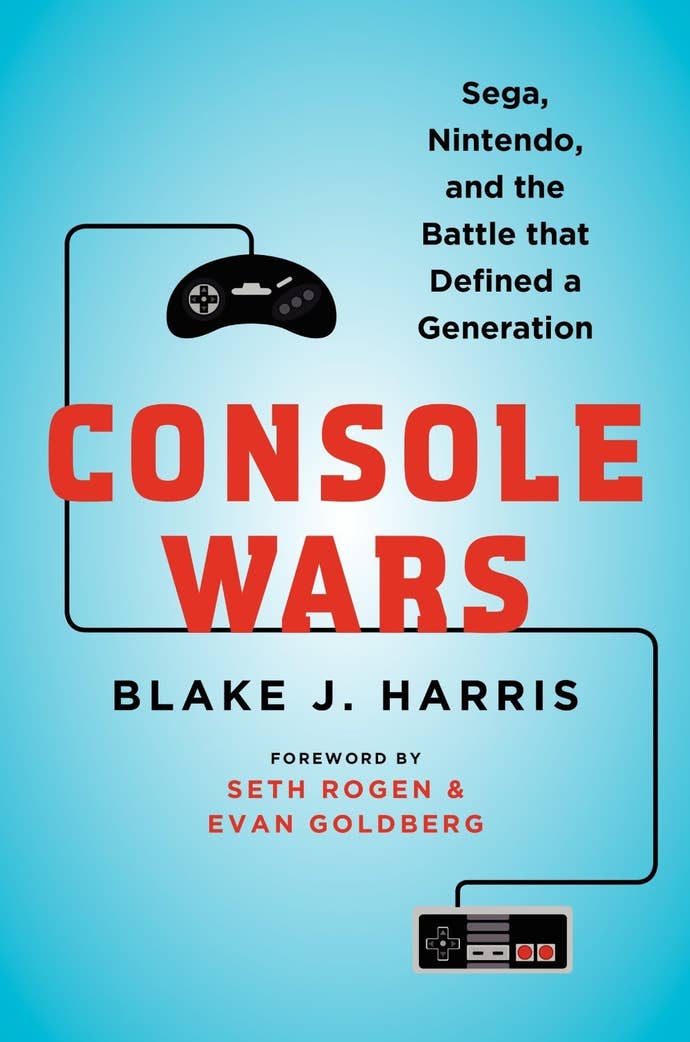Review: Console Wars: Sega, Nintendo, and the Battle that Defined a Generation
If you're interested in the early-'90s battle of Sega v. Nintendo, Blake Harris' tome is exhaustive, required reading.
This article first appeared on USgamer, a partner publication of VG247. Some content, such as this article, has been migrated to VG247 for posterity after USgamer's closure - but it has not been edited or further vetted by the VG247 team.
In its first few pages, Blake Harris' Console Wars gets off on the wrong—though not completely unexpected—foot: a rambling, unfunny dialogue between Seth Rogen and Evan Goldberg, two guys who normally don't rub me the wrong way.
Even though this foreword is fleeting, their dull barbs about the sexual tension between Sonic and Tails had me assuming Console Wars would be another easy, breezy tour of video game history, replete with the standard anecdotes we've all heard a million times by now. "Mario is named after Nintendo of America's first landlord, you say?" It's the kind of disposable, mass-market book on video games you see the most, usually branded with titles like Blip! Bleep! Bloop! How Video Games Rescued the Princess and Took Over the World.
Thankfully, Console Wars avoids this trap, and sticking two Hollywood types in its opening (as well as on the cover) might be a bit of overcompensation on Harris' part. While the history depicted within its nearly 600 pages stretches over five very busy years of video game history, Console Wars excels in its sheer specificity. Much of this information has been collected before, but never so exhaustively, and rarely packaged within a single narrative. David Sheff's long out-of-print Game Over used to be the gold standard for reading up on this particular period of video game history, but Console Wars goes beyond a simple account of Nintendo's 8 and 16-bit dominance by placing the reader squarely in the shoes of its underdog competitor.

By the end of Console Wars you'll know more about the inner workings of Sega than you ever thought possible, though Harris doesn't simply recount basic facts. The majority of his book is written as a dramatization, which functions primarily to build a history by placing important information in the mouths of actual people. So an event as simple as "Tom Kalinske visits Sega for the first time" gives Harris a chance to create a scene which helps characterize his subjects and allows for related information to be dropped in along the way. For the most part, this approach works, though when Harris digs a little too deep into his characters' psyches, his attempts at pathos ring a little shmaltzier than intended.
This device was a smart move on Harris' part, as Console Wars has a lot to say about every excruciating detail of Sega's battle against Nintendo, as well as Sony's dalliances with just about everyone. The logistics behind every price drop, press event, and television commercial are expressed in exhaustive detail, and at the heart of every scene beats a Sorkin-style sense of urgency. Harris' fastidiousness can be a little frustrating at times, though, and while what he presents is rarely irrelevant, a few sections could have been trimmed here and there for the sake of brevity. Console Wars devotes several pages to the VHS/Betamax war, for instance, yet also-rans like the TurboGrafx 16 and the Atari Jaguar only get a middling paragraph each.
Still, these moments of self-indulgence are few in number, and Console Wars does an excellent job of exposing how a dose of healthy competition transformed video games into the massive industry we know it as today. And, unsettlingly enough, Harris' book also shows how much of our gaming tastes have inevitably been formed through the efforts of cold, calculating businesspeople. This isn't a criticism of Harris' writing, but Console Wars is essentially a history of executives and business decisions, and given the hush-hush world of Japanese game development, more interesting stories lurk in the background that will probably never be told—the breakneck development cycle of Sonic 2, for instance, feels like it could merit an entire book by itself. But if you lived through this heady era, Console Wars is a great read as well as a way to relive every unexpected moment of Sega's struggle against Nintendo from the perspective of people much, much more important than you.


